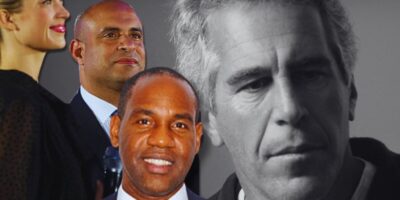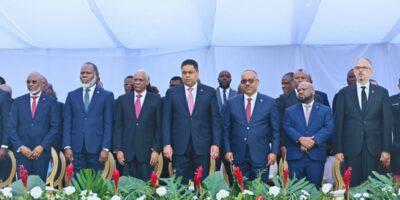The US does wield significant influence in Haiti—we live in the shadow of a superpower whose historical prejudice against Haiti continues to shape policy
The Federal Aviation Administration (FAA) recently announced a ban on flights to Haiti after gang members shot at a Spirit Airlines flight mid-air.
Two other aircrafts, from JetBlue and American Airlines, were also found to have sustained bullet damage upon their return to the US. Meanwhile, escalating gang violence has forced the closure of Haiti’s border with the Dominican Republic. As these events unfold, many Haitians feel trapped in their own country—a familiar position.
After gaining independence from France, Haiti faced isolation by world powers, driven by racism and fear of Black self-determination.
Our ancestors persevered despite this hostility, building a nation from the ashes of revolution. Today, we face another crucible, but the enemy is within our borders while anti-Haitian sentiment surges abroad – from Florida’s harsh immigration policies to xenophobic campaign rhetoric across America.
After gaining independence from France, Haiti faced isolation by world powers, driven by racism and fear of Black self-determination.
Yet instead of looking inward for solutions, we reflexively set our gaze outward. Conversations about Haiti’s security, governance, and sovereignty almost invariably circle back to one familiar culprit: the United States.
The US does wield significant influence in Haiti—we live, after all, in the shadow of a superpower whose historical prejudice against Haiti continues to shape its policies. But our obsession with American power has become a mental prison. Could this moment serve a different purpose? Could it be a call for Haitians to rise and reclaim control of our country’s fate, even as we acknowledge and resist ongoing racism?
Our fixation on American influence does more than distract—it binds and paralyzes us. We inflate US power to mythic proportions, perceiving its hand everywhere. In doing so, we internalize white supremacy’s logic, actively denying our agency and undermining our potential. The deeper tragedy is that we’ve defined ourselves not by our actions but by a conviction that the US controls our destiny, stifling our ability to envision a future of true self-determination.
The Myth of American Omnipotence in Haitian Politics
Take, for instance, the recent fall of Prime Minister (PM) Garry Conille. His removal by the Transitional Presidential Council (CPT) directly opposed US interests and demonstrated a rare moment of Haitian autonomy. Reports show that the US Ambassador even attempted to broker a deal to keep Conille in power. Yet, in a quintessential paradox, the same people who had accused Conille of being a US puppet couldn’t accept that the CPT acted independently. Instead, they created new theories: Conille lost his job for « doing the right thing, » or his trip to the US-ally United Arab Emirates had angered Washington, which then « allowed » the CPT to fire him. The simple truth? Conille engaged in a political clash with the CPT, lacked popular support and political allies, and was forced out despite US backing. Yet we continue to twist the story, desperately crafting narratives that keep the US at the center of a Haitian-made political drama.
This obsession with US influence doesn’t just obscure our reality; it dilutes our power and blinds us to our capacity to govern. In mythologizing American control, we cede our strength to an invisible puppeteer.
White Supremacy as a Self-Sustaining Trap
Our reliance on external narratives doesn’t just weaken us—it traps us. White supremacy has embedded itself so deeply in our worldview that we struggle to accept our political realities without seeing America or “the blan” behind every event. Even those who see themselves as revolutionary thinkers fall into this psychological trap, doubting that Haitians might act in their interest—even to the nation’s detriment.
This pattern is evident in our discussions of arms trafficking. Despite efforts to foster a more nuanced conversation on the issue, the narrative remains oversimplified. No matter how many Haitians are arrested for smuggling weapons from abroad, or how often gangs kidnap and kill fellow Haitians to acquire more powerful weapons—often sourced from the Dominican Republic as far back as 2016, as recently as last week, or even stolen from Colombian military bases and sold to Haiti’s gangs—we persist in seeing Uncle Sam’s hand plotting our demise. We imagine a hidden US agenda to wipe out Haitians in pursuit of our supposed iridium reserves.
We’ve come to believe that every event in Haiti—even natural disasters—is controlled by the US.
The Reality of Haitian Sovereignty
We do have options. However, the first act is to recognize that we are at war and that’s why, in my 2023 article, « Opinion | A Five-Point Inclusive Plan for Sustainable Security and Stability in Haiti, » I offered strategies to tackle the security crisis starting from that premise.
At its core, the article rests on two fundamental beliefs: first, we are at war, and second, we must marshal all our resources to fight. Solidarity is essential. We must see any loss of territorial integrity, whether in Port-au-Prince or Pont-Sonde, as a loss for the entire nation and respond accordingly. This means mobilizing the active participation and sacrifice of all Haitians to maintain our national integrity.
In this plan, I proposed a three-tiered security framework, which strengthens the Haitian National Police (HNP) and military and calls for nationalizing private security firms, which employ an estimated 75,000 to 90,000 people—significantly more than the registered police force. Lastly, I highlighted the Haitian diaspora’s critical role in financially contributing to the war effort in support of our security forces.
Facing White Supremacy in Haiti and the US
I do not dismiss the influence of the US or other international players—they wield significant financial and military power. However, their influence cannot define our aspirations or dictate our future.
In the US, Haitian communities have endured the brunt of white supremacy, emboldened by the rhetoric of the president-elect and his vice president.
President Trump used the same rhetoric in his first run, which I wrote about in 2021. Despite widespread opposition and acknowledgment of this president’s unfitness for office, American voters accepted the electoral outcome. We, in Haiti, must show similar courage and honesty in confronting our uncomfortable truths.
Haitian economic and political leaders have created and continue to enable the gangs. Rather than addressing insecurity and protecting citizens, officials remain consumed by power struggles. While foreign interference has played a role, it is Haitian hands that have steered us to this point.
In the US, Haitian communities have endured the brunt of white supremacy, emboldened by the rhetoric of the president-elect and his vice president.
Despite Haitians in the US feeding the pipeline of weapons flowing into Haiti, and even members of the clergy being arrested and prosecuted for trafficking arms and ammunition, two narratives dominate the conversation: that Haiti does not manufacture weapons and ammunition, and that the US must stop the flow of arms to Haiti. While both points are true, they oversimplify the issue and deflect accountability for the Haitian state’s responsibility to secure its borders and coastlines.
Gangs now control towns and cities and continue to encroach on other areas, exposing the myth of « safe spaces. » Yet some still cling to the illusion that they can insulate themselves from the crisis.
Solidarity—or, at the very least, self-preservation—must compel us to use the still-secure regions in the north and south as strongholds for national resistance. The diaspora must also step up to support this war effort. Together, and only together, can we stop and reverse Haiti’s decline.
Toward a New Haitian Consciousness
Breaking free from the narrative of white supremacy requires us to recognize that, while the US has influence, true liberation lies in reclaiming our minds and aspirations. We must actively work to reclaim our agency.
The surge of anti-Haitian sentiment in US politics—from Florida’s harsh immigration policies to the xenophobic campaign rhetoric that echoed across America—proves that racism against Haitians remains a brutal reality. This is not a call to dismiss America’s historical and ongoing prejudice against Haiti, nor deny its influence, but rather to stop granting it absolute power over our destiny. By redefining our narrative, we can shift from passive victims to architects of Haiti’s future.
We must allow ourselves to envision a different Haiti—one where our actions reflect a steadfast belief in our strength and capacity for meaningful change.
Cover image | UN Photo/Manuel Elias Ghada Fathi Waly (on screen), Executive Director of the United Nations Office on Drugs and Crime, briefs Security Council members on the situation in Haiti. ©Nations Unies
► AyiboPost is dedicated to providing accurate information. If you notice any mistake or error, please inform us at the following address : hey@ayibopost.com
Keep in touch with AyiboPost via:
► Our Channel Telegram : Click here
► Our Channel WhatsApp : Click here
► Our Community WhatsApp : Click here







Comments